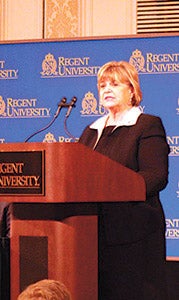The power of being positive
Published 10:18 pm Thursday, March 5, 2015
Suffolk Mayor Linda T. Johnson sought to accentuate the positive and project optimism during a forum for South Hampton Roads mayors at Regent University.

Suffolk’s Linda T. Johnson speaks during a forum for South Hampton Roads mayors, at Regent University on Thursday. The region’s cities need to work together and have a positive outlook, she said.
The Executive Leadership Series event had the region’s five mayors reflect on whether Hampton Roads remains in recession.
“No, I don’t think we are in recession anymore,” Johnson said, cutting to the chase early in her remarks. “We are coming out, and we are doing extremely well.”
Johnson plugged regional organizations, including Reinvent Hampton Roads, a community initiative tasked with creating “high-paying, satisfying jobs to underpin a vibrant economy,” according to its website.
“We spend a lot of time talking about changing ourselves … (but) it’s so important to embrace what we have (and) embrace the businesses we have,” Johnson said.
Touching on a theme all the mayors covered, Johnson said the five cities must work together for the betterment of the entire region. “No man is an island, and certainly no city is an island,” she said.
Johnson listed several industries she says have taken off in Suffolk under her watch but gave the food and beverage industry special mention. That industry has great potential for the region, she said.
Johnson said she is encouraged by the “refocused efforts” of the Hampton Roads Economic Development Alliance, which has just announced new leadership.
The region needs to sell itself better, Johnson suggested, with colleges and universities playing a larger role. “They can’t just be a bullet point in a presentation,” she said.
Johnson touted Suffolk’s 5.1-percent unemployment rate, citing “five straight months of declining unemployment … a great indicator for where we are going.”
The city’s AAA credit rating was “hard” to achieve, she said, “but it was worth it, and it gives us a great ability to move forward and do great things.”
Johnson finished by saying the greatest threat to Hampton Roads — and the world, for that matter — is negativity.
“What we need to collectively do is be a positive force, and get up every morning and thank God for what we do have and make the best of it,” she said.
Chesapeake Mayor Alan P. Krasnoff said the region needs to improve transportation infrastructure, linking to the Port of Virginia, to capitalize on national economic growth. He cited a U.S. Department of Transportation study that concluded the U.S. economy will grow by 115 percent to $36.7 trillion by 2045, and transportation will account for $1.6 trillion of Gross Domestic Product.
The region has to do a better job of leveraging its diversity, Portsmouth Mayor Kenneth I. Wright said. “It’s always been mindboggling to me how with all this diversity, we continue to ignore how our strength lies in our diversity.”
Virginia Beach Mayor Will Sessoms said the slow pace of the economic recovery in Hampton Roads troubles him. The region needs to always keep investing in itself, he said, and it needs to carve itself a slice of the burgeoning biomedical industry.
Norfolk’s Paul Fraim also urged continuous investment. “Even in tough times, you have got to invest in your future,” he said.
Fraim also promoted a major expansion of light rail services, from Williamsburg down to Portsmouth and all the way to the Virginia Beach oceanfront.
“This is doable. All we have to do is commit ourselves to it,” he said.
One topic frequently touched upon was the need to retain local talent. Too many young people from the region are moving elsewhere after college, the mayors agreed. During question time, one young man asked the mayors how they would attract more Millennials. “Sell me on moving to Hampton Roads after graduation,” he said.
Opportunity exists here for them, according to Johnson. “I have a 37-year-old son who traveled extensively in his career and decided to come home and start businesses here,” she said.
“There are endless opportunities. In our city, modeling and simulation is a big piece; tourism is a big piece; health and wellness, that also is a large possibility.”






